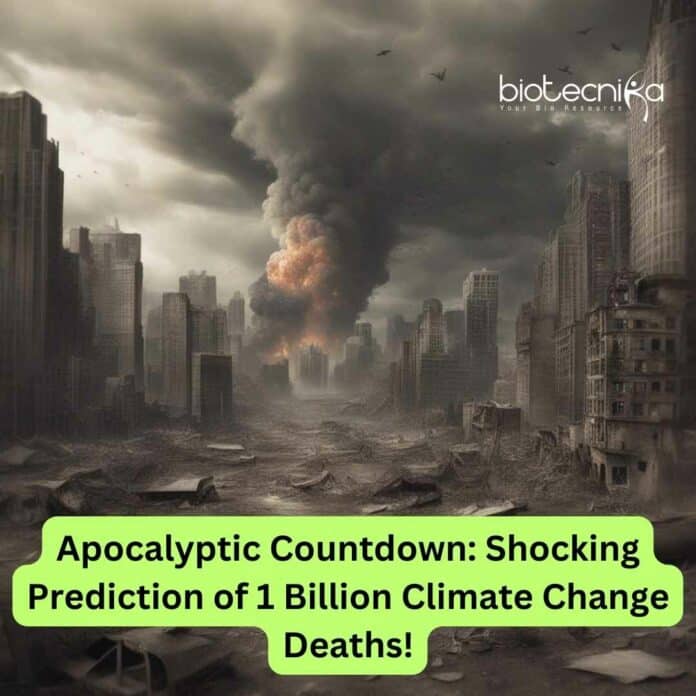Climate Change Predictions – 1 Billion Climate Change Deaths!
In the not-so-distant future, the choices we make today could reverberate into a catastrophic loss of human life.
After examining a comprehensive array of research articles on the human toll of climate change, a staggering revelation has emerged. Conservative estimates indicate that the world could witness the demise of around one billion people over the next century due to climate-related disasters – a truly alarming prospect. This projection, like any glimpse into the future, hinges on a series of assumptions and calculations.
One pivotal concept is known as the ‘1000-ton rule.’ This principle suggests that for every thousand tons of carbon dioxide humanity releases into the atmosphere, an indirect but chilling fate awaits a future individual. If global temperatures rise by 2°C above the preindustrial average – a trajectory we’re currently tracking – the consequences could be dire. For every 0.1°C increase in temperature from this point onward, the planet may mourn approximately 100 million lives.
Joshua Pierce, an energy specialist from the University of Western Ontario in Canada, elucidates, “Taking the widely accepted 1,000-ton rule seriously and crunching the numbers, human-induced global warming could translate to a billion untimely deaths within the next century. Urgent action is not just a choice; it’s a necessity.”
Estimating the human mortality rate attributed to climate change is a daunting task, even in the present. The United Nations reports that approximately 13 million lives are claimed by environmental factors each year. However, disentangling how many of these fatalities stem directly or indirectly from climate change remains a challenge.
Certain experts posit that abnormal temperatures alone might be responsible for up to five million deaths annually. Other estimations propose lower figures. The complexity arises from the multifaceted global effects of climate change. Crop failures, droughts, floods, extreme weather events, wildfires, and rising sea levels all weave intricate and indirect impacts on human well-being.
Forecasting the exact toll of these climate-related catastrophes is inherently uncertain. Yet, Joshua Pierce and Richard Parncutt from the University of Graz in Austria argue that it’s a pursuit worth undertaking. They propose that quantifying emissions in terms of human lives offers a more relatable perspective for the general public, accentuating the urgency of our current inaction.
Pierce emphasizes, “A billion lives hang in the balance due to global warming. As climate models refine their predictions, we can increasingly attribute the harm inflicted upon our children and future generations to our own actions.”
Illustrating this point, Pierce and Parncutt apply the 1000-ton rule to Australia’s Adani Carmichael coal mine – poised to be the world’s largest. Should all the reserves in this mine be burned, the consequences could be the premature deaths of an estimated three million people in the years to come. Pierce and Parncutt stress, “Many of those in danger are children from the Global South. Burning Carmichael coal could tragically seal their fate.”
It’s important to note that the 1000-ton rule doesn’t encompass the potential impact of climate feedback loops, which might amplify the environmental fallout from carbon emissions, intensifying the repercussions at an accelerated pace. This rule serves as a “best estimate” within a range of 0.1 to 10 deaths per 1000 tons of carbon emitted, acknowledging the potential for graver scenarios than those outlined.
Pierce acknowledges, “Climate scientists often exercise caution when communicating their findings, as no one wishes to appear alarmist. We’ve adhered to this principle and yet the outlook remains grim.”
Accepting this harsh reality is essential for both the public and policymakers alike.
This study’s findings were published in the journal Energies.
Climate Change Predictions – 1 Billion Climate Change Deaths!



























